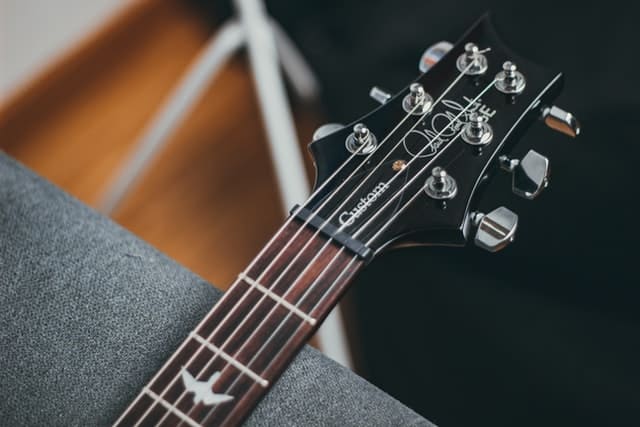A lot of people worry that leaving your strings in tune while not using your guitar will cause some sort of damage to it.
The fear is that if you don’t detune your strings you’ll cause your guitar to warp.
You don’t need to detune your strings when not playing guitar, your guitar was designed to hold shape under the tension of wound strings. In fact, detuning and retuning too regularly may have adverse effects.
I know that there are two camps on this and that there are those who would disagree.
Maybe the points given are valid in some contexts, but I’m going to go over everything regarding string tension in detail so you can make a more informed decision for yourself.
Should you loosen the strings of your guitar after using it?
Not in my opinion.
Guitar necks are designed with string tension in mind and they provide the necessary counter-pressure to remain in balance when strung up. Loosening your strings is fine when doing a string change, but you shouldn’t leave your guitar unstrung for too long.
The reason why is that the whole design of the neck, even down to the wood is built to resist the string tension and by leaving your guitar unstrung, you can actually wind up with your neck bowing backward.
Can string tension damage your guitar in any way?
Not really.
There is one case that I can think of where string tension will damage your guitar and that is if you release string tension too quickly. How would you do that? By snipping your guitar strings while they’re under tension.
Shocking and horrifying stuff, I know, but it’s been done.
String tension, when maintained on your guitar, won’t cause damage, and most guitars have a truss rod to help the neck counter the constant tension. Even when changing your strings, the decrease in tension won’t be bad if you go about doing it right.
There might be the question of different string gauges and while thicker strings are harder on your neck, they’re still within a tolerance that’s been accounted for.
But say you were to release the tension on your strings very quickly, like with the snipping idea. What happens here is that your neck is under a lot of tension and then it’s suddenly released and that instant release can cause a huge shock to your neck, damaging it.
That’s about the only way string tension can damage the neck, if it’s shifted too quickly.
Why do so many people think they need to loosen their guitar strings?
I think it has a lot to do with people mistaking the effects that humidity changes have on your guitar as being caused by string tension.
There are two cases where you need to mainly be considering your guitar’s humidity and not its string tension. One is when you’re traveling and the other is when you put your guitar in long-term storage.
Traveling to different parts of the world exposes your guitar to different climates and different humidities and your guitar will react to this as the wood of the neck becomes accustomed to your home humidity.
When traveling, you can account for these changes by detuning your guitar half a step or a whole step down, but don’t completely remove the strings.
For long-term storage, you’ll want to maintain humidity within the guitar storage case, the way to do this is to open it up once every two weeks and use a humidifier to rehydrate the wood.
In both cases, warping can occur if not treated properly, but it’s not due to string tension.
Some other people also think you should never loosen or take off strings
They’re half right, you should never leave your guitar unstrung for too long.
You’re going to have to take your strings off when you inevitably change them, so it’s generally unavoidable. My approach when switching strings is to take them all off together, clean the neck of my guitar and then put the new ones on.
There are some people who go about replacing their old strings with new ones by removing and adding strings one at a time to get around this, holding fast to their belief that it will damage their guitar neck.
This isn’t a good approach either because while you may not be causing huge amounts of stress on your guitar by switching one string at a time, you are making it nearly impossible to clean the neck.
You find someone who never removes all their strings and you’ll likely have found someone with a very dirty fretboard too.
Guitars are way tougher than you think
We all value our guitars greatly and I’m sure the idea of scratching it or bumping it alone is enough to send you into a cold sweat, but the fact is that guitars are built to withstand abuse.
Aside from the neck, guitar bodies are reinforced and everything is held together with high-end materials (unless you’ve bought a real cheapo guitar). While you might break your guitar if you use it to play baseball, you’re unlikely to break it if you use it as intended.
If you can’t take my word for it, you can surely take a master luthier’s word right? Most luthiers will be able to tell you the ins and outs of looking after your guitar and I will bet that none of them will tell you to never unstring your guitar.
I’m not saying be careless, but I am saying that some worries are ill-founded and hopefully today we’ve put one of them to rest.

Hello there, my name is Ramiro and I’ve been playing guitar for almost 20 years. I’m obsessed with everything gear-related and I thought it might be worth sharing it. From guitars, pedals, amps, and synths to studio gear and production tips, I hope you find what I post here useful, and I’ll try my best to keep it entertaining also.





